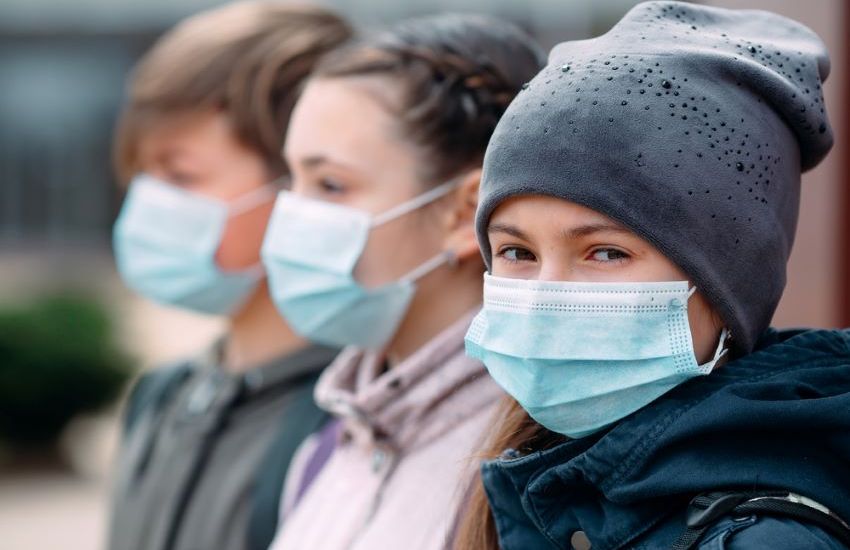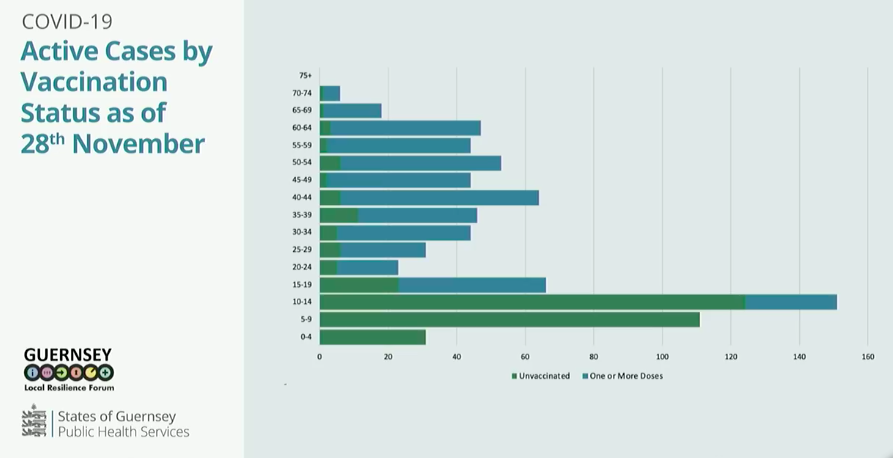


Students and staff in secondary schools and further education must wear face coverings in communal areas from today.
Staff in primary schools must wear masks where physical distancing between adults is not possible, but there remains no requirement for primary-age children to cover up.
Children now account for nearly half of all active cases of covid-19 and yesterday one in four secondary students and one in five primary students was absent from school.
Face coverings have been “strongly recommended” in communal areas of secondary schools since 29 October. But the Committee for Education, Sport & Culture is making them mandatory following a surge in covid-19 cases and as the island braces itself for the possible arrival of a new variant of the virus.
Deputy Andrea Dudley-Owen, President of the Committee, thanked those who have been wearing masks at schools. But she said there was “a noticeable lack of consistency among secondary students as a collective and staff across all our schools – so we have decided to strengthen our policy position on this”.
“We know that face coverings are just one of the protective measures in place in education settings to reduce risk of transmission,” said Deputy Dudley-Owen.
“But it’s important that we are all as vigilant as possible, especially in the run-up to Christmas, as we seek to continue living responsibly with covid-19 with as little disruption as possible."

Pictured: Deputy Andrea Dudley-Owen and her Vice-President, Deputy Bob Murray, have been watching covid-19 cases and absences rise among schoolchildren and staff and have decided that from today masks should be compulsory in communal areas of secondary schools and further education.
Deputy Dudley-Owen appealed for support from staff and students but also said that students who fail to comply with the new instructions will not be excluded.
“We know that the situation at the moment is difficult, but we appeal to our students and staff to do their bit and lend their support,” she said.
“While no student will be excluded if they refuse to wear a face covering, our expectation is that the policy will be followed by all who it applies to in the same way as any other school rule. Staff will do their best to enforce it proportionately.
“As a community, we have shown that we can work as Guernsey Together throughout the pandemic and I want to thank students, staff, parents and carers in advance as I’m sure that all will pull together in support.”
The requirement to wear masks applies only to communal areas of schools – for example, corridors and halls. The Committee is resisting the requests of some, including one of the largest teachers’ unions, to make masks compulsory in classrooms.

Pictured: At a Civil Contingencies Authority briefing last night, Director of Public Health, Dr Nicola Brink, presented a break down of active covid-19 cases by age, which showed the disproportionate burden currently falling on children.
Nick Hynes, Director of Education, said that the Committee’s directions on face coverings had to be adjusted as the circumstances of the pandemic changed.
“We’ve tried to strike the right balance between risk mitigation and remaining proportionate to that risk,” said Mr Hynes. “It’s also really important to remember that we have a suite of mitigations already in place in education settings to help minimise the risk of transmission.”
In SEND schools (Special Educational Needs and Disabilities), face coverings will be worn by staff and students where appropriate and practicable.
For staff and students unable to wear a face covering, lanyards and exemption cards are available. More information about them is available ONLINE HERE.
Face coverings are required on school transport for students in Years 7-13.
“Most children will be able to wear their face covering without difficulty for their bus journey,” said the States. “However, no child should be prevented from travelling by bus because they do not have or are unable to tolerate wearing a face covering.”
After it was noted that there is no single, island-wide policy on events outside school, Mr Hynes clarified that such decisions continue to be made at school level rather than by the Committee or the Education Office.
Comments
Comments on this story express the views of the commentator only, not Bailiwick Publishing. We are unable to guarantee the accuracy of any of those comments.